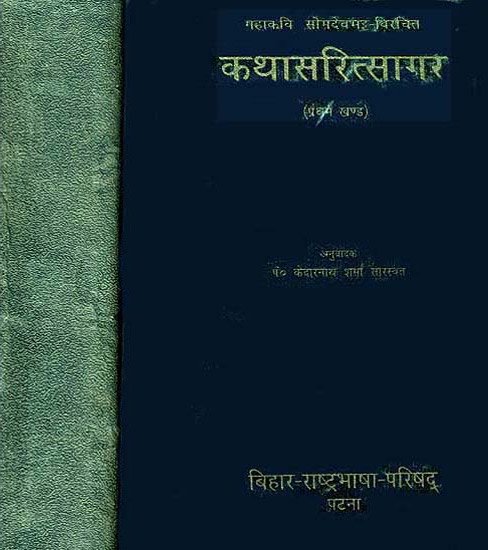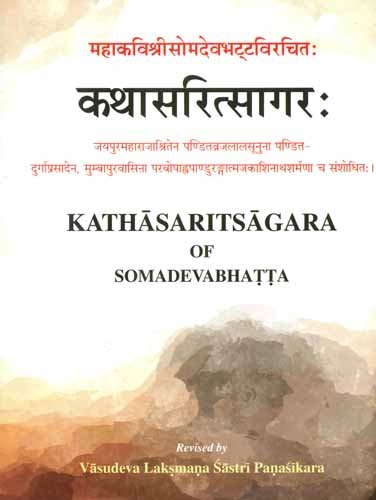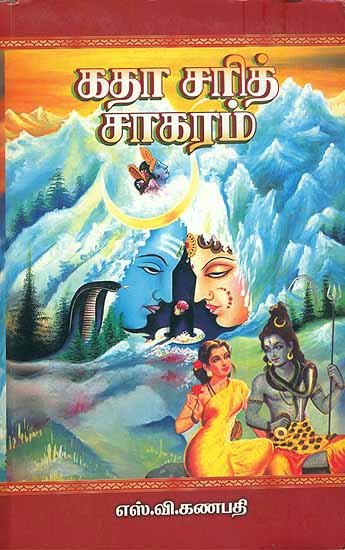Kathasaritsagara [sanskrit]
by C. H. Tawney | 2014 | 226,424 words | ISBN-13: 9789350501351
The Sanskrit edition of the Kathasaritsagara referencing the English translation and grammatical analysis. Written by Somadeva and dating from the 12th century, the Kathasaritsagara (or Katha-sarit-sagara) represents an epic legend narrating the adventures of Naravahanadatta as he strives to become the destined emperor of the Vidyadharas. Alternative titles: (Kathāsaritsāgara, कथासरित्सागर, Kathā-sarit-sāgara)
Verse 5.1.233
यो विप्रः क्षत्रियो वा ननु कनकपुरीं दृष्टवान् सो ऽभिधत्ताम् तस्मै राजा किल स्वां वितरति तनयां यौवराज्येन साकम् ।
सर्वत्राघोष्यतैवं पुनर् अपि पटहानन्तरं चात्र शश्वन् न त्व् एकः कोऽपि तावत् कृतकनकपुरीदर्शनो लभ्यते स्म ॥ २३३ ॥
yo vipraḥ kṣatriyo vā nanu kanakapurīṃ dṛṣṭavān so 'bhidhattām tasmai rājā kila svāṃ vitarati tanayāṃ yauvarājyena sākam |
sarvatrāghoṣyataivaṃ punar api paṭahānantaraṃ cātra śaśvan na tv ekaḥ ko'pi tāvat kṛtakanakapurīdarśano labhyate sma || 233 ||
The English translation of Kathasaritsagara Verse 5.1.233 is contained in the book The Ocean of Story by C.H. Tawney. This book is available online or you could buy the latest edition:
Read online Buy now! The English translation by C.H. Tawney (2014)
Glossary of Sanskrit terms
Note: This extracts Sanskrit terms and links to English definitions from the glossary, based on an experimental segmentation of verse (5.1.233). Some terms could be superfluous while some might not be mentioned. Click on the word to show English definitions.
Yah, Vipra, Kshatriya, Var, Nanu, Kanakapuri, Drishtavat, Sah, Abhi, Tad, Raja, Rajan, Raj, Kila, Sva, Vita, Rati, Tanaya, Yauvarajya, Sakam, Saka, Sarvatra, Evam, Eva, Punar, Api, Patahanantara, Shashvat, Eka, Kah, Tavat, Kritaka, Naka, Puri, Darshana, Sma,
Analysis of Sanskrit grammar
Note: this is an experimental feature and only shows the first possible analysis of the Sanskrit text (Kathasaritsagara Verse 5.1.233). If the system was successful in segmenting the sentence, you will see of which words it is made up of, generally consisting of Nouns, Pronouns, Verbs, Participles and Indeclinables. Click on the link to show all possible derivations of the word.
- Line 1: “yo vipraḥ kṣatriyo vā nanu kanakapurīṃ dṛṣṭavān so 'bhidhattām tasmai rājā kila svāṃ vitarati tanayāṃ yauvarājyena sākam ”
- yo* -
-
yaḥ (indeclinable relative)[indeclinable relative]ya (noun, masculine)[nominative single]yaḥ (pronoun, masculine)[nominative single]
- vipraḥ -
-
vipra (noun, masculine)[nominative single]
- kṣatriyo* -
-
kṣatriya (noun, masculine)[nominative single]
- vā* -
-
vār (noun, masculine)[adverb], [nominative single], [vocative single]vār (noun, neuter)[adverb], [nominative single], [vocative single], [accusative single]va (noun, masculine)[nominative plural], [vocative plural]vā (noun, feminine)[nominative plural], [vocative plural], [accusative plural]
- nanu -
-
nanu (indeclinable)[indeclinable]
- kanakapurīm -
-
kanakapurī (noun, feminine)[accusative single]
- dṛṣṭavān -
-
dṛṣṭavat (noun, masculine)[nominative single]√dṛś -> dṛṣṭavat (participle, masculine)[nominative single from √dṛś class 1 verb]
- so' -
-
saḥ (indeclinable correlative)[indeclinable correlative]so (noun, feminine)[compound]sa (noun, masculine)[nominative single]
- abhi -
-
abhi (indeclinable preposition)[indeclinable preposition]abhi (noun, masculine)[compound], [adverb]abhi (noun, neuter)[compound], [adverb], [nominative single], [vocative single], [accusative single]abhi (noun, feminine)[compound], [adverb]abhī (noun, masculine)[adverb]abhī (noun, neuter)[compound], [adverb], [nominative single], [vocative single], [accusative single]abhī (noun, feminine)[adverb]abhi (Preverb)[Preverb]
- dhattām -
-
√dhā (verb class 3)[imperative active third dual], [imperative middle third single]
- tasmai -
-
tad (noun, neuter)[dative single]sa (noun, masculine)[dative single]
- rājā -
-
rājā (noun, feminine)[nominative single]rājan (noun, masculine)[nominative single]rāj (noun, masculine)[instrumental single]rāj (noun, neuter)[instrumental single]
- kila -
-
kila (indeclinable particle)[indeclinable particle]kila (noun, masculine)[compound], [vocative single]√kil (verb class 6)[imperative active second single]
- svām -
-
svā (noun, feminine)[accusative single]
- vita -
-
vita (noun, masculine)[compound], [vocative single]vita (noun, neuter)[compound], [vocative single]
- rati -
-
rati (noun, feminine)[compound], [adverb]ratī (noun, feminine)[adverb], [vocative single]
- tanayām -
-
√tan -> tanayām (periphrastic_perfect)[periphrastic_perfect from √tan]tanayā (noun, feminine)[accusative single]
- yauvarājyena -
-
yauvarājya (noun, neuter)[instrumental single]
- sākam -
-
sākam (indeclinable)[indeclinable]sāka (noun, neuter)[adverb], [nominative single], [accusative single]
- Line 2: “sarvatrāghoṣyataivaṃ punar api paṭahānantaraṃ cātra śaśvan na tv ekaḥ ko'pi tāvat kṛtakanakapurīdarśano labhyate sma ”
- sarvatrā -
-
sarvatra (indeclinable)[indeclinable]
- aghoṣyatai -
-
√ghuṣ (verb class 0)[imperfect passive third single]
- evam -
-
evam (indeclinable adverb)[indeclinable adverb]evam (indeclinable)[indeclinable]eva (noun, masculine)[adverb], [accusative single]eva (noun, neuter)[adverb], [nominative single], [accusative single]evā (noun, feminine)[adverb]
- punar -
-
punar (indeclinable adverb)[indeclinable adverb]punar (indeclinable)[indeclinable]
- api -
-
api (indeclinable preposition)[indeclinable preposition]ap (noun, neuter)[locative single]
- paṭahānantaram -
-
paṭahānantara (noun, masculine)[adverb], [accusative single]paṭahānantara (noun, neuter)[adverb], [nominative single], [accusative single]paṭahānantarā (noun, feminine)[adverb]
- cāt -
-
ca (noun, masculine)[adverb], [ablative single]ca (noun, neuter)[adverb], [ablative single]
- ra -
-
ra (noun, masculine)[compound], [vocative single]ra (noun, neuter)[compound], [vocative single]
- śaśvan -
-
śaśvat (indeclinable)[indeclinable]śaśvat (noun, masculine)[compound], [vocative single]śaśvat (noun, neuter)[nominative single], [vocative single], [accusative single]
- na -
-
na (indeclinable particle)[indeclinable particle]na (noun, masculine)[compound], [vocative single]na (noun, neuter)[compound], [vocative single]
- Cannot analyse tv*ek
- ekaḥ -
-
eka (noun, masculine)[nominative single]
- ko' -
-
kaḥ (indeclinable interrogative)[indeclinable interrogative]ku (noun, feminine)[vocative single]ka (noun, masculine)[nominative single]kaḥ (pronoun, masculine)[nominative single]
- api -
-
api (indeclinable preposition)[indeclinable preposition]ap (noun, neuter)[locative single]
- tāvat -
-
tāvat (indeclinable)[indeclinable]tāvat (indeclinable correlative)[indeclinable correlative]tāvat (noun, masculine)[compound]tāvat (noun, neuter)[nominative single], [vocative single], [accusative single]
- kṛtaka -
-
kṛtaka (noun, masculine)[compound], [vocative single]kṛtaka (noun, neuter)[compound], [vocative single]
- naka -
-
naka (noun, masculine)[compound], [vocative single]naka (noun, neuter)[compound], [vocative single]
- purī -
-
purī (noun, feminine)[compound], [nominative single]puri (noun, feminine)[nominative dual], [vocative dual], [accusative dual]
- darśano* -
-
darśana (noun, masculine)[nominative single]
- labhyate -
-
√labh (verb class 1)[present passive third single]
- sma -
-
sma (indeclinable)[indeclinable]sman (noun, masculine)[compound]
Other editions:
Also see the following editions of the Sanskrit text or (alternative) English translations of the Kathasaritsagara Verse 5.1.233
Kathasaritsagar
by Kedarnath Sharma Saraswat (2005)
The Only Edition with the Sanskrit Text and its Hindi Translation (An Old and Rare Book) Set of 3 Vol.
Buy now!
Kathasaritsagara of Somadeva Bhatta (Sanskrit Text Only)
by Vasudeva Laksmana Sastri (2013)
Katha Sarit Sagar in Marathi
by H. A Bhave (1995)
Set of 5 Volumes; Published by Varada Books, Pune. 2256 pages (Throughout B/W Illustrations).
Buy now!
Katha Sarit Sagara (Tamil)
by S. V. Ganapati (எஸ். வி. கணபதி) (2014)
[கதா சரித் சாகரம்] Published by Alliance Publications.
Buy now!
Galpa Shono
by Abhijit Chattopadhyay (2014)
[গল্প শোনো] Galpa Shono: Bengali Translation of 'Suno Kahani From Katha Sarit Sagar'; 9788126015436; Published by Sahitya Akademi, Delhi.
Buy now!Preview of verse 5.1.233 in Bengali sript:
যো বিপ্রঃ ক্ষত্রিযো বা ননু কনকপুরীং দৃষ্টবান্ সো ঽভিধত্তাম্ তস্মৈ রাজা কিল স্বাং বিতরতি তনযাং যৌবরাজ্যেন সাকম্ ।
সর্বত্রাঘোষ্যতৈবং পুনর্ অপি পটহানন্তরং চাত্র শশ্বন্ ন ত্ব্ একঃ কোঽপি তাবত্ কৃতকনকপুরীদর্শনো লভ্যতে স্ম ॥ ২৩৩ ॥
![Kathasaritsagara [sanskrit] - book cover](/uploads/a/Katha-Sarit-Sagara.jpg)




